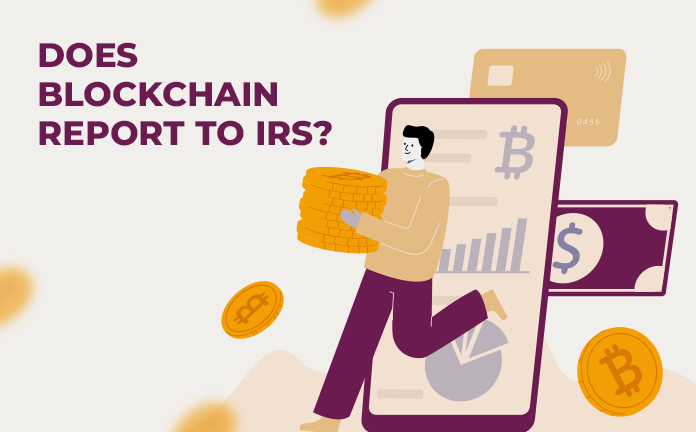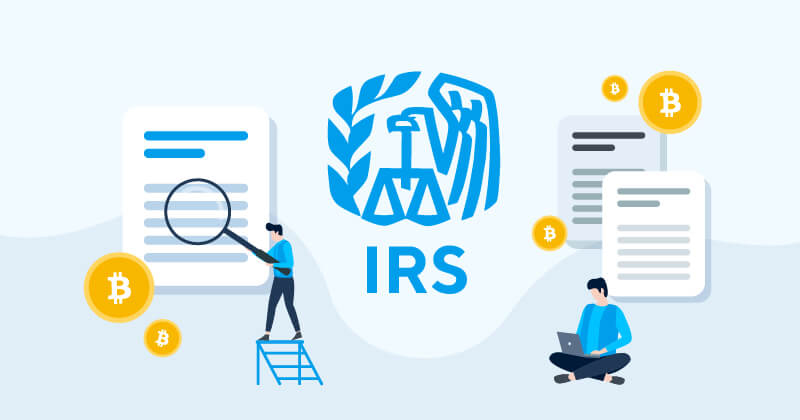Does Blockchain Report to IRS?

Does Blockchain Report to IRS? In this blog post, we will break down the tax implications of crypto transactions and explore how to report your crypto taxes.
Let’s get started!
The issue of whether or not blockchain should report to the Internal Revenue Service (IRS) has been a source of debate among many experts.
On one hand, blockchain is a form of distributed ledger technology that offers users a decentralized and secure way to store and transfer data.
On the other hand, the IRS requires that all financial transactions be reported to them to ensure appropriate taxation and compliance.
Now, the potential problems with requiring blockchain to report to the IRS is the potential security risks associated with centralized data storage. With blockchain, users can store and transfer data without the need for a centralized server, which makes it more difficult for hackers and other malicious actors to gain access to their data.
However, if the IRS required blockchain to report to them, the data would become centralized and could potentially be more vulnerable to attack.
So,
Does Blockchain Report to IRS?
In the United States, the Internal Revenue Service (IRS) requires taxpayers to report their transactions involving virtual currencies, including transactions made using blockchain technology, on their tax returns.
The IRS treats virtual currency transactions as taxable by law, and taxpayers may be subject to penalties for failing to report their virtual currency transactions accurately.
If you have engaged in any transactions involving virtual currency, including those made using blockchain technology, you may need to report them on your tax return. This includes buying, selling, crypto exchanging, or using virtual currency to pay for goods or services.
It is important to keep accurate records of your virtual currency transactions, as the IRS may request documentation to support the information reported on your tax return.
You should consult with a tax professional or refer to IRS guidance on virtual currency transactions for more information on how to report these transactions accurately.
Blockchain and Tax Implications
The blockchain is an increasingly popular technology that is being used in a variety of industries and sectors. With the rise of virtual currencies such as Bitcoin, Ethereum, and Litecoin, the question of how to report cryptocurrency transactions to the Internal Revenue Service (IRS) has become a major point of discussion.
As blockchain technology continues to evolve, it is important for taxpayers to understand the tax implications of using this technology.
When it comes to cryptocurrency transactions, the IRS considers them to be taxable income. This means that if you have earned any income or profits from selling or transferring cryptocurrency, then it must be reported on your tax returns.
Taxpayers should be mindful of any gains or losses from any cryptocurrency transactions, as these must be reported on Form 1099-K and included in their overall tax liability.
Furthermore, if a taxpayer has mined, or earned, any cryptocurrency, then this must also be reported to the IRS.
In order to properly report cryptocurrency taxes, taxpayers should keep detailed records of all of their transactions. This should include the date, type, and value of each transaction, as well as any applicable fees.
Additionally, taxpayers should keep track of any cryptocurrency they receive as payment for goods or services, as this is also considered taxable income. By keeping detailed records, taxpayers can ensure that they are accurately reporting their cryptocurrency taxes to the IRS.
Disadvantages of Not Reporting Blockchain Transactions to the IRS
Despite the growing popularity of cryptocurrency and blockchain technology, many people are still unaware of the risks associated with not reporting their transactions to the Internal Revenue Service (IRS).
Cryptocurrency is considered property by the IRS, and any gains made from trading, investing, or exchanging cryptocurrency are subject to taxation. While there is no legal requirement to report these transactions, the consequences of failing to do so can be severe.
One of the most significant disadvantages of not reporting blockchain transactions to the IRS is the risk of being audited. The IRS has been actively tracking cryptocurrency transactions since 2017 and can take legal action against those who fail to report.
Furthermore, it is difficult to accurately track crypto transactions due to the lack of a centralized ledger, meaning it is easy to overlook or overlook incorrectly reported transactions. A failure to report could result in fines, interest, and potential criminal action.
Those who are new to cryptocurrency, or those who are unfamiliar with the taxation rules, may find it difficult to understand the process of reporting their transactions to the IRS. Fortunately, there are a number of online resources and services designed to help with the process.
For instance, Coinbase provides a service that allows users to view their previous transactions, generate a report of their activity, and file their taxes. Additionally, there are a number of cryptocurrency tax software solutions available to help users accurately and easily report their blockchain transactions.
In summary, not reporting blockchain transactions to the IRS can have serious legal and financial implications. Therefore, it is important to understand the taxation rules and regulations regarding cryptocurrency, and to ensure that all transactions are properly reported.
How to Report Blockchain Transactions to the IRS

Make sure you keep your records of the market value of the currency at the time you buy it and when you sell it. The difference can help inform you on how much taxes need to be paid.
This is not always an easy thing to find that information. If you deal with stocks, for example, the broker will send you a 1099-B form each year. This shows all your transactions in detail, makes things easier.
But when it comes to crypto, you may not get it. This is because people don’t know much about paying taxes. Leading up to 2023, the federal government has announced that online cryptocurrency brokers will be asked to provide information on customers and bought or sold coins.
If you qualify as a High Frequency Trader with transactions worth up to $20,000, you can expect a 1099-K form to be sent to you at the year’s end.
If you ignored to include your benefits in your income, don’t think that they should go unnoticed by the IRS.
Also Read – Smart Contracts in Blockchain: Development and Unit Testing Explained
Conclusion
You might not know much about the governmental duty implications of cryptocurrencies in the blockchain. You’ve just found out all there is to know! Despite this, the IRS does not recognize unawareness of rules for filing as a valid reason for failing to comply with these regulations. You’ll need to have a plan in place with proper records.
